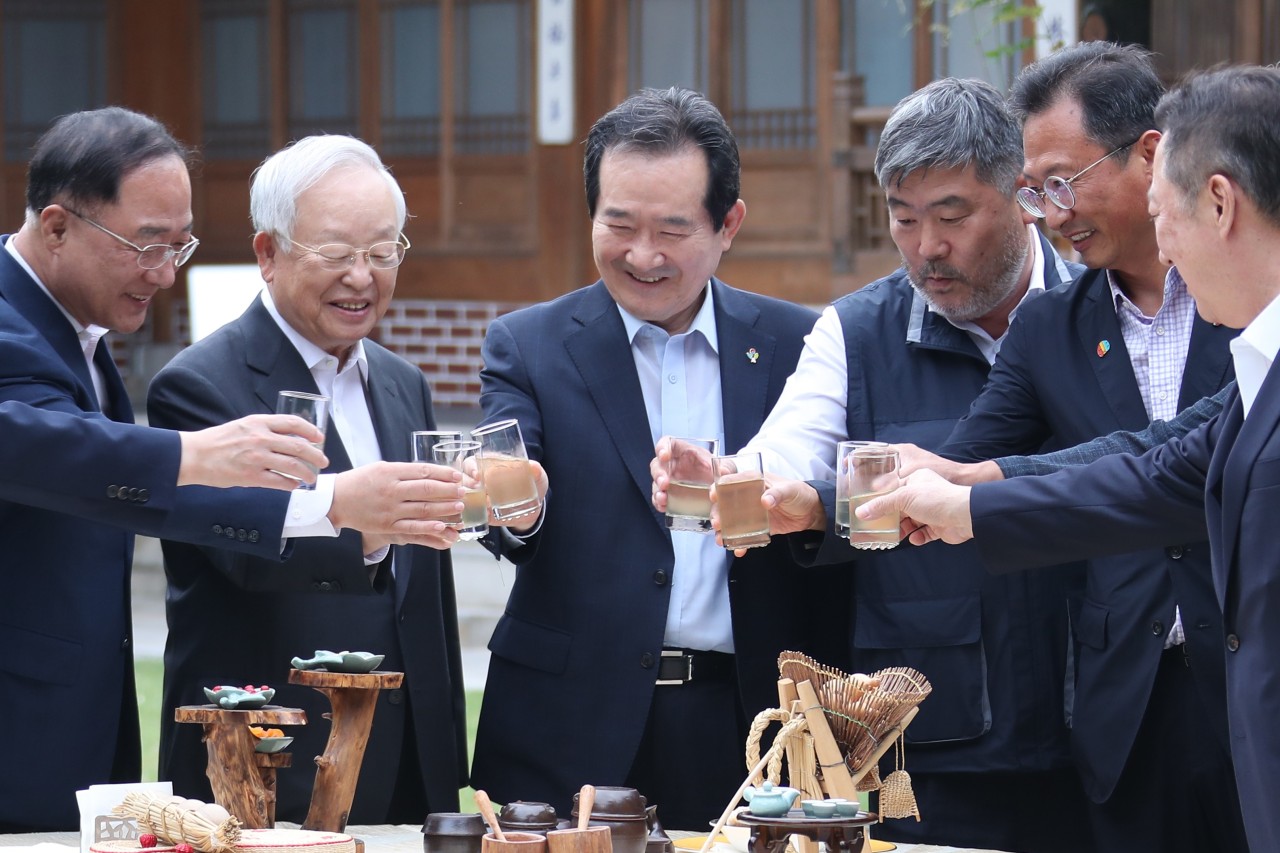 |
From left: Finance Minister Hong Nam-ki, Korea Enterprises Federation Chairman Sohn Kyung-shik, Prime Minister Chung Sye-kyun, Federation of Korean Trade Unions Chairman Kim Dong-myung, Korean Confederation of Trade Unions chief Kim Myeong-hwan and Korea Chamber of Commerce and Industry Chairman Park Yong-maan toast before starting the eighth tripartite dialogue earlier this month. The sector representatives of labor, business and the government have been struggling to reach an agreement on ways to overcome the economic crisis amid the COVID-19 pandemic by Tuesday as scheduled from disagreements. (Yonhap) |
Tripartite dialogue between sector representatives of labor, business and the government to find ways to overcome the COVID-19 crisis is forecast to end with no solid outcome within this month, as scheduled, as the three parties are nowhere near closing gaps between their drastically different arguments and demands.
The parties agree on the need to stabilize employment and support businesses struggling from fallen profit levels, but the ways to achieve those goals and how to finance support initiatives are yet to be agreed upon.
Representatives from each interest group gathered again with Prime Minister Chung Sye-kyun on Monday to finalize the deal by Tuesday as promised earlier this month.
Since the start of dialogue last month, labor representatives have argued for the government to bar layoffs and maintain employment at businesses to fight against the ongoing unemployment crisis.
Within the list of demands, the two labor groups requested the government extend its payouts to businesses for sustaining employment that started in April and terminates at the end of this month, while expanding the criteria for more industries to be included.
They also requested the national employment insurance expand for more groups of workers as a means of social safety net. The labor representatives asked that a sickness benefit plan be introduced as part of their demands.
“The government has so far poured out more than 250 trillion won ($209 billion) in supporting the affected national economy under the COVID-19 crisis, but it isn’t clear how that amount helped to maintain the lives of the working class,” said a spokesperson for the Korean Confederation of Trade Unions, one of Korea’s two major umbrella labor groups.
“We are trying to make sure workers’ demands are upheld in the next supplementary budget, but the government has been too passive at the negotiation table, so we believe it is unlikely that a deal to be struck this month as planned.”
So far, the government has remained mostly silent on providing its official stance regarding the tripartite dialogue and ministries have remained conservative, pointing out that excessive spending can worsen the financial soundness of the country.
The government has nevertheless shown its intention to partly give in as needed, vowing some level of financial support for the initiatives if deemed manageable.
“Drawing out an agreement from this tripartite dialogue will be an exemplary case of what we call social compromise,” Finance Minister Hong Nam-ki said in a meeting last week. “For a deal to be made, the government has shred its vision to collaborate as much as possible within the extent.”
But the distance between labor and business circles is greater, as business representatives feel the burden is too high for them to uphold the labor groups’ demands to raise the overall wage level for all workers.
“There actually is a huge gap between us and the labor representatives,” said a spokesperson for the Korea Enterprises Federation. “We need flexibility in working hours to make up for lost work hours and profits, which the labor groups do not consider.”
“Businesses have also told us that there is no room for them to pay out higher wages,” he added.
It is critical for the group to reach a deal by Tuesday as the Federation of Korean Trade Unions, the other major umbrella labor groups in Korea, threatened to pull out of the talks if no agreement is reached by then. But as the government has vowed to reach a deal within this month, labor groups are worried that the deal that may be announced Tuesday will be anything but a fruitful outcome.
“We believe all of us are too short on time to draw out a formidable result, so the tripartite dialogue could be extended for the time being,” the KCTU spokesperson said.
“Nothing is set in stone yet. We will just have to wait and see what actions will be taken next if the FKTU pulls out as it said.”
By Ko Jun-tae (
ko.juntae@heraldcorp.com)








![[Today’s K-pop] Blackpink’s Jennie, Lisa invited to Coachella as solo acts](http://res.heraldm.com/phpwas/restmb_idxmake.php?idx=644&simg=/content/image/2024/11/21/20241121050099_0.jpg)